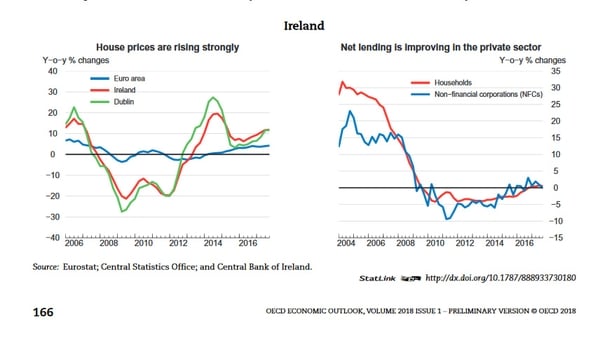The Organisation for Economic Cooperation and Development has today warned that some signs of "over-heating" have started to emerge, while Brexit is the biggest risk facing the economy.
In its biannual Economic Outlook, the OECD said the property market is buoyant, as house prices and construction investment are rising strongly.
It also said that despite high bank lending rates, new mortgage loans and SME loans - largely driven by construction-related ones - are increasing sharply.
The Paris-based organisation said that the Central Bank's policy tools currently in place, such as the loan-to-value and loan-to-income caps, have reduced the share of risky loans.
These measures should be extended if necessary, it advised.
The OECD said that economic activity here is projected to remain robust, but to ease gradually. It predicted that domestic demand will remain strong with solid employment growth and consumption.
But as the labour market tightens, wage pressures will be strong, which will feed into higher inflation, it added.
Read more:
Trade war risk stalks global economic outlook - OECD
Given uncertainties to the outlook, the OECD also said the Government should remain committed to improving the fiscal position.
On the National Development Plan, the OECD said the plan should be implemented but only if the target of further reducing public debt is adhered to. This would ensure that only those projects that are cost-effective are implemented.
"This will benefit fiscal sustainability, while avoiding over-heating the economy," it added.

The OECD also recommended that the Government should assess up-skilling and re-skilling programmes provided by SOLAS, expand those that are effective and wind down those that are not.
According to the OECD, risks to Ireland's economic outlook are elevated, with the most immediate risk being Brexit.
"Property prices may increase more strongly, which would boost further construction activity in the near term but may induce another property bubble associated with a strong surge in credit growth," it stated.
"Persistently high private indebtedness also poses a downside risk, as it leaves the economy sensitive to rising interest rates," it added.

